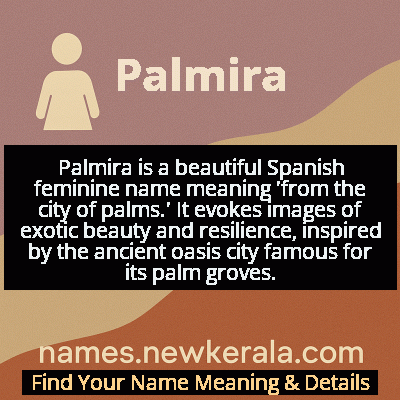Palmira Name Meaning & Details
Origin, Popularity, Numerology Analysis & Name Meaning of Palmira
Discover the origin, meaning, and cultural significance of the name PALMIRA. Delve into its historical roots and explore the lasting impact it has had on communities and traditions.
Name
Palmira
Gender
Female
Origin
Spanish
Lucky Number
7
Meaning of the Name - Palmira
Palmira is a beautiful Spanish feminine name meaning 'from the city of palms.' It evokes images of exotic beauty and resilience, inspired by the ancient oasis city famous for its palm groves.
Palmira - Complete Numerology Analysis
Your Numerology Number
Based on Pythagorean Numerology System
Ruling Planet
Neptune (Ketu)
Positive Nature
Intuitive, analytical, spiritual, and inquisitive.
Negative Traits
Secretive, reserved, aloof, and can be overly critical.
Lucky Colours
Green, yellow.
Lucky Days
Monday.
Lucky Stones
Cat’s eye, moonstone.
Harmony Numbers
1, 5, 6.
Best Suited Professions
Scientists, researchers, spiritual leaders, detectives.
What People Like About You
Depth of knowledge, analytical skills, spirituality.
Famous People Named Palmira
Palmira Bollo
Chef and Cookbook Author
Pioneering Uruguayan chef who wrote one of the first comprehensive South American cookbooks
Palmira Tárrega
Pianist and Composer
Renowned Spanish pianist and composer, sister of famous guitarist Francisco Tárrega
Palmira Reguero
Actress
Argentine film and television actress known for her work in Latin American cinema
Palmira Wu
Diplomat
Mexican diplomat and cultural ambassador specializing in international relations
Name Variations & International Equivalents
Click on blue names to explore their detailed meanings. Gray names with will be available soon.
Cultural & Historical Significance
In Spanish-speaking cultures, Palmira evokes images of exotic beauty, resilience, and intellectual sophistication. The name gained popularity during the Renaissance when classical names experienced a revival, and later during the 19th century Romantic period when orientalist names became fashionable. Throughout Latin America, Palmira often appears in place names and as a given name, symbolizing both the exotic appeal of distant lands and the practical strength of palm trees that withstand harsh conditions while providing sustenance and shelter. The name maintains a connection to urban sophistication while honoring natural resilience, making it particularly meaningful in cultures that value both tradition and adaptability.
Extended Personality Analysis
Women named Palmira typically exhibit a unique blend of grace and resilience, much like the palm trees that inspire their name. They often possess an exotic elegance combined with practical strength, able to weather life's challenges while maintaining their dignity and beauty. Palmiras are frequently described as sophisticated, cultured individuals with a natural curiosity about the world and different cultures. Their personality often reflects the historical city's role as a crossroads—they tend to be excellent mediators, understanding multiple perspectives and bringing people together.
These individuals usually demonstrate strong leadership qualities paired with diplomatic skills, reminiscent of Queen Zenobia who ruled Palmyra. They're often creative problem-solvers who can thrive in challenging environments, adapting like palm trees in desert conditions. Palmiras typically value knowledge and education, showing particular interest in history, arts, and cultural exchange. Their strength is usually quiet but formidable—they don't seek attention but command respect through their competence, wisdom, and unwavering principles. Many display a nurturing quality, providing support and shelter to those in their circle while standing firm in their convictions, embodying the palm tree's ability to create oases in difficult circumstances.
Modern Usage & Popularity
In contemporary times, Palmira maintains a presence as an elegant, somewhat uncommon choice that appeals to parents seeking a name with historical depth and cultural sophistication. While never reaching mass popularity, it enjoys steady usage among families with appreciation for classical education, history, or Mediterranean heritage. The name has seen mild resurgence in recent years as vintage names return to fashion, particularly in Spain, Italy, and Latin American countries. Urban data shows it's most popular in regions with strong historical connections to Mediterranean culture, and it's often chosen by parents who value uniqueness without being overly unconventional. Modern Palmiras benefit from having a distinctive yet easily pronounceable name that works well in multicultural environments and professional settings, bridging traditional elegance with contemporary global sensibility.
Symbolic & Spiritual Meanings
Symbolically, Palmira represents resilience, beauty in adversity, and cultural crossroads. The palm tree imagery evokes strength and flexibility—the ability to bend without breaking during life's storms while continuing to grow upward. Like palm trees that provide shade, food, and materials, the name suggests a nurturing, resourceful nature. The connection to the ancient city adds layers of historical wisdom, trade and exchange of ideas, and the meeting of different cultures. Metaphorically, Palmira symbolizes someone who can create oases in desert times, offering refuge and wisdom. The name also carries connotations of victory and peace, as palm branches have historically represented triumph and harmony across multiple civilizations, from ancient Roman victories to Christian symbolism of martyrdom and eternal life.

